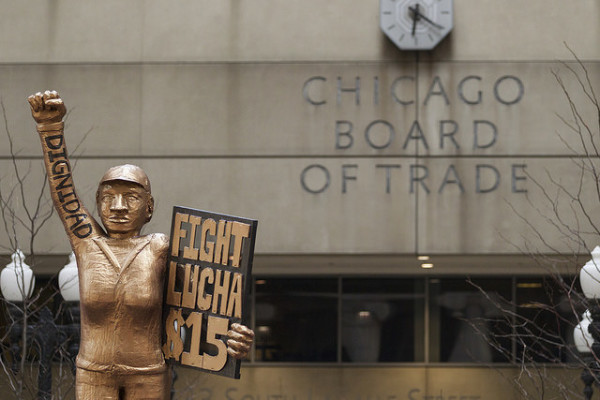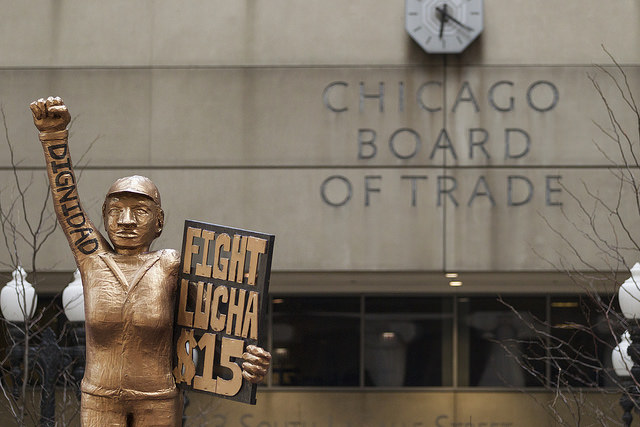
This weekend, low-wage workers from around the country will be arriving in my city, Richmond, to make a case for increasing the minimum wage. It’s the first-ever national convention for the Fight for $15 movement, which in the past few years has launched wide-ranging strikes and protests to raise awareness about how a $7.25-an-hour wage—the current federal minimum—just doesn’t cut it for many workers struggling to make ends meet for themselves and their families.
There’s a long line of economic arguments in favor of, and opposed to, increases in the minimum wage. Among other things, opponents say it will raise prices for consumers, cause employers to slash jobs or cut back on workers’ hours, and put many companies out of business. Advocates say it will help the economy by giving workers more money to spend in their communities, encouraging the unemployed to seek out work, and reducing the stress and anxiety the working poor deal with, as well as their reliance on government benefits.
As important as the economic impacts of this policy are, however, it’s even more important to consider its cultural and moral implications. After all, that’s what drives much of the widespread public support for increasing the minimum wage, even among people who have never heard of, say, the elasticities of labor supply and demand. Many Americans just don’t think it is right that people who work hard should have to struggle so hard.
To be sure, the research on the minimum wage gives us little reason to despair—or cheer—over its impact on the economy. The most rigorous studies seem to suggest that it doesn’t make a big difference in terms of employment and growth. A 2014 open letter signed by 600 economists, including seven Nobel laureates, advocated raising the minimum wage to $10.10, noting that the “weight of evidence” showed “little or no negative effect” on employment for minimum-wage workers. Meanwhile, the increase would lift wages for them and likely “spill over” to other low-wage workers, too, possibly stimulating the economy to a “small” degree, the economists wrote.
Most recently, a University of Washington study of the increase in Seattle’s minimum wage to $11—on its way to $15 in 2017—tried to sort out the impact of the wage hike alone, sifting away the effects of other changes in the economy occurring at the same time. It found mixed results. A bit higher wages, but a bit fewer hours. Somewhat less employment, but no increase in business closings.
Make of these studies as you will, but it’s hard to argue that the sky is falling down in places where wage policies have changed. And while a higher minimum wage will give low-wage workers fatter paychecks, it obviously cannot, by itself, pull the working class out of its decades-long malaise of stagnant wages and growing insecurity.
These economic analyses provide important context, but the policy question really boils down to one of values. America has always prided itself for being founded on principles rather than a single cultural persuasion, and Americans have held onto few principles as steadfastly as the value of hard work. An honest day’s toil should get you by. And yet we have millions of Americans who work full-time and are still in poverty. We have millions working at global corporations like Walmart and McDonald’s that pay their workers so little that their business models rely on government to pick up the tab—by providing Medicaid, food stamps, refundable tax credits, and the like.
Adapting our laws and our economy to match our principles will take time. With any change, there will be some who gain, and some who lose out, more than others. But overall society will be better off—and it’s not just because some people will make more than they used to.
When we pay living wages, the culture changes, too. As Katherine Newman found in her classic study of fast-food workers, No Shame in My Game, part of what makes it hard to take a low-wage job is not that people don’t want to work—it’s that society has such disdain for those making chump change behind a McDonald’s counter or in a Walmart stockroom. (This is also one reason that immigrants—who aren’t under the same sorts of social pressures as the native-born—will do the poorly paid jobs others won’t.)
In the research for my book about the long-term unemployed in America and Canada, I came across one man out of work for more than a year after the car-parts plant that employed him shut down. He had avoided having to live on the street by moving into his mom’s house. When I spoke to him, he had just given away his last unemployment check to his daughter so that she could have something of a normal Christmas.
“I’m forty-three years old and living off my mother,” he told me. He was ashamed about accepting his family’s help, but he felt he had to do it. What he wasn’t willing to do, though, was work at a fast-food restaurant. He had put in twelve years at a respectable job, he pointed out. “I don’t want to throw on a goofy hat.”
If we believe that certain jobs are so undignified that we won’t even pay someone a decent wage to do them, then we shouldn’t be surprised that people with a decent amount of self-respect won’t do them. Opponents of raising the minimum wage seem to be blind to this. They talk about the economic pros and cons of wage laws as if those were the only things that matter. But people in the real world don’t just have balance sheets, they also have pride.
If you don’t think that making economic policy based on principle is realistic, then consider the extent to which it has already occurred—in the direction of greater income inequality. In 1965, CEOs made 20 times more than a typical worker, according to the Economic Policy Institute; in 2014, they made 300 times more. Part of this shift was due to global competition and changes in labor and financial markets, but some of it can be linked to the dwindling sense of obligation that those at top now have toward their workers, as Mark Mizruchi and other scholars have noted.
As many of today’s corporate leaders see it, making obscenely larger amounts of money than their employees do is no longer cause for guilt. The boardroom culture tells them they deserve it. And so they continue to push for changes in tax laws to make sure the economy’s outcomes reflect their own principles of self-profit.
Indeed, in other rich countries with different social norms, the gap between CEO and worker pay is nowhere near as extreme—and the minimum wage tends to be much higher, too. These countries have clear notions of what’s fair and appropriate to pay for a day’s work, and they have chosen to pursue practices and policies in line with those beliefs.
Even those of us who want government to do more for the working poor often forget the importance of this broader cultural context. Yes, we should take advantage of targeted, technocratic solutions such as earned-income tax credits that make low-wage work pay better. But it should trouble us that these policies often amount to having the government subsidize employers who refuse to foot any extra labor costs. Furthermore, having a company pay a higher wage and having the government supplement that wage are very different things. Or at least they are when we look from the vantage point of flesh-and-blood human beings—as opposed to that of the rational-actor stick men in economic models. We brag about our paychecks, not our tax credits.
What we pay those at the bottom also has something to say about the dignity and connectedness of our society as a whole. If every wage is a living wage, those of us who are more fortunate won’t be living in such a different world from those sweeping our floors and serving our food. An entry-level job won’t be such a laughable and undignified proposition that a kid in a poor town or neighborhood won’t even consider taking it over a flashier (and deadlier) gig on the corner. If we think people are worth more than a pittance, they will act that way—and treat others that way.
In a sense, it’s fitting that Richmond, the former capital of the Confederacy, a city with a history of stark racial and economic inequalities, should host the Fight for $15 convention. The old plantation-based economy disappeared not because it wasn’t profitable. It disappeared because it wasn’t just. If we truly believe in our values, we should make our economy reflect them.
Victor Tan Chen Victor Tan Chen is In The Fray's editor in chief and the author of Cut Loose: Jobless and Hopeless in an Unfair Economy. Site: victortanchen.com | Facebook | Twitter: @victortanchen
- Follow us on Twitter: @inthefray
- Comment on stories or like us on Facebook
- Subscribe to our free email newsletter
- Send us your writing, photography, or artwork
- Republish our Creative Commons-licensed content

